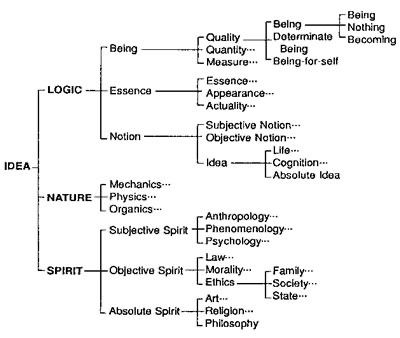#hegelianism
Text

Hegel’s logic deals with the development of God's thinking, prior to the creation of the world, and is called heavenly logic. However, unlike formal logic, it does not merely deal with the formal laws of thought. Although it holds itself to be the development of God's thinking, it attempts to deal with the most universal definitions and laws of reality.
#georg wilhelm friedrich hegel#hegelianism#hegelian dialectic#hegel#philosopy#german philosophy#western philosophy#metaphysics#absolute idealism#idealism#miscellanea
540 notes
·
View notes
Text
Questions and disputations
Life offers us a variety of problems and matters for consideration. Thought, that boundless source of occupation, is moved uncontrollably between day to day affairs, mantras, abstract speculations, aspirations to greatness and success (or perhaps we should say, sensibleness), and, of course, our search for meaning.
Certainly, it seems we need a lot of affirmations during the day, and this is a common theme in wellness buzzwords, that one needs to affirm one's own happy existence - his sweet life as Shakespeare called it (Midsummer Night's Dream) - to be more content or presumeably see some great, as of yet unperceived joy about his or her life. However, to me it appears as if ones true intrepidity, his richness and luck, is verily found in a certain sternness of spirit, in fact, why in nothing more than persevering or holding out during one's time, or, in fact, continuing forever with the simple routine God has deemed him fit to perform.
The process of acquiring factual truth is terrifying. Frankly, we are often taken aback when attempting to fathom excellences in concrete theory. Speculative confrontalism is unlimited, but foundations are found in divine contemplations. The how and why of predicaments is full; however, in principle there may be a difference in the conflagration of contemplative derailment and psychology. By all means, amendment has to set the particulars of confusion to a directive. Eternity, in a theological sense, aids us in the assention of hope in a valid and actual showdown between liminaries and cognitivities. The graphic, of nominal disputation, is full of diminishings in the wholeness of distinct areas of freedom. The capability, of sheer remembrance, has some relation to the simplicity of significant description, and yet the revolution of commemorative indomitability may aid us in a discrete way, but this will always haunt us in the last analysis.
These are crazy things, but the strangeness of life is always going to make us say unusual things. The inner and the outer are distinct. In our inner life we move chaotically to find some fixed point or foundation; in our outer life we state the obvious and rail against enemies, or seek to stand our ground somehow, but as someone once said: there are no enemies here.
A well-known Dutch author referred to the television as the "treurbuis" or weeping tube. I am moving into my own place this month and one of the things on my list is to purchase a television. However, in a weird way it frustrates me. I love to just sit and allow time to pass; in a way, this is my main hobby, but some - weeping, sorrowful - part of me does desire a television in my house, as if it wouldn't be a house otherwise: that's almost the thing, that I am just desecrating this entire zone of my own house to another man's idea of "home", of having a spell at home. Somewhere I am thinking I don't even want a television. It's like, you can just hae a room with maybe a radio, bookcases, a piano even - and then you can dwell in your house in contemplative concentration, doing what you like and frolicking a bit. It is all about the "duur uw uur" of Albert Verwey. Life is really not composed of acts, but rather of routines, and our mission is truly to be the best we can be in the limited time we have: to do something meaningful, to develop our repertoire, to be happy in our work.
In practice, there is no knowledge: from there comes the notion that academic philosophy is not knowledge, but sport, custom. However, there is a time and place for philosophy. A man can consider the mysteries of the universe, but he can also fight for them, wage a war. In any case, waging a war is the only time ideas are completely relevant. Not because war is supposed to destroy another. On the contrary, we see that the philosophical war is aimed at growing each other in knowledge, to some extent. The capital is the cerebral. We strive in life to achieve some degree of elevation, to escape from our wretched predicament. The thing is, we can find ourselves involved in a variety of art forms, and each genre gives us opportunities to become fuller, wiser individuals. The point is to take on certain projects. This is all more than simply passing the time.
We decide what is good. Religion is dealing with humans. Yes, we can't always understand religion, but all religions have a cause that keeps them together, a design and order. We don't need order, but we do need a cause. This is how people congregate.
So we see that there is no way to fix our attention entirely on an idea. All ideas constantly vie against each other. Conquering oneself is an illusion, for if it isn't the cosmic truth that satisfies us, then it will be some passing problem that bugs our mind. But so we do see that we don't really need anything to relate to our fellow man. All we need is a cause. I will state that the best thing for us is to embrace a certain lifestyle. It could be Punk Rock, but frankly I feel more attracted to more national themes. The best thing for us is to find some common ground in the metaphysical quagmire.
Life is truly diverse. We move from the inner to the outer, and then we are swamped by crazy problems, but there is a simpleness to the foundation of the world that can be found even in an untroubled, easy stance to life's affairs.
#a midsummer night's dream#note#ramblings#gerrit komrij#hegelianism#latinity#education#christianity#buddhism#daoism
0 notes
Text
414 notes
·
View notes
Text



I really love the concept of an Atsushi / Akutagawa / Kyouka trio as it was shown in Dead Apple, and I really wish it would become a thing. I think it's neat how here Kyouka's dominant color is shown being purple as balance / synthesis of blue and red. Kyouka also uses as this kind of bridge between organizations since she was a member of both at some point, and still holds a very deep understanding of how they work. I think Kyouka could really make the sskk team work as a way to find balance between these two opposites that would otherwise clash and destroy each other.
#I'm thinking of some kind of Hegelian dialectic model of thesis (Atsushi) antithesis (Akutagawa) and synthesis (Kyouka)#Although I must admit that the idea of a girl finding a peaceful compromise between two belligerent men hits a gender stereotypes nerve–#I don't really like (╥﹏╥)#atsushi nakajima#ryūnosuke akutagawa#kyōka izumi#bsd#bungou stray dogs#bsd s2#bsdrewatch2023
336 notes
·
View notes
Text
do i ship wincest. yeah they're an inseparable pair on a narrative and thematic level, can you truly understand one without understanding the other? they're two halves of a dialectic on heroism and sacrifice. they're two points on the family trauma survivor spectrum, sometimes opposing, sometimes intersecting. they're like watching your parents who should've gotten a divorce years ago somehow stay together, against all reason. they're two inheritors of a rugged American masculinity and isolated individualism, internal and external violence springing forth. regressing to the nostalgia of frontier brotherhood as substitute for the nuclear family. they're a set of quintessential outlaw lovers. maybe true love only exists in the kind of freedom you keep when you're always moving, on the road, in your childlike bubble excluded from society, left with nowhere to burrow your roots except into each other's very being. they're the world's loneliest childhood shared between two feral dogs, one biting down on the other, unable to let go. they're the fantasy of an unconditional love so powerful it can survive the apocalyptic enormity of your own self-loathing. they're a set of matryoshka dolls, one consuming the other. journeys end in lovers meeting, but what kind of journey is it really when you've never left home: it's been sitting in the seat next to you this entire time. your haunted house is not a home but a person who'll never let go. they're an erotic fantasy of domestic horror as a sweet, sickening embrace as opposed to an all-consuming fire, a car driving off into heaven's sunset as opposed to one crashing into a tree. (wrong: they're both). so horribly enmeshed and trapped in a magnified love so destructive to the world around them they leave catherine and heathcliff wuthering heights in the dust. they're two brothers trapped in a 15 year long spiral of an abusive codependent pseudo-marriage, in part due to a network unable to let go of a successful show format, thus unable to afford them any growth that might disturb the status quo. but the implications of it all.
#when the fuck did i write this. anyways. in case anyone was ever in doub about what i'm about#wincest#samdean#also shipping =/= the primary way i interpret characters or a story lol. it's like tiramisu after dinner. a lil dessert as a treat.#honestly 75% they're like a Hegelian dialectic discoursing on the outcomes of childhood abuse in my mind#my meta#j.txt
380 notes
·
View notes
Note
gwf hegel
He wasn’t just “phenomenal” at Philosophy if you know what I mean…
33 notes
·
View notes
Note
Could you please explain what the fuck is a hegelian e-girl?
Just some grad student types who tried to drum up post-Red Scare counterculture clout and maybe some stray right-wing tech money by promoting themselves in New York and on social media as having a glamorously radical philosophical solution to our political polarization problems. (Here is a five-day-old two-hour-long YouTube video with 11K views introducing our heroines before their project's recent dissolution. Their explanations of dialectical method and of what's wrong with my generation are good and persuasive.) The phenomenon is not that important—it's funny because of their intense self-seriousness and solemnity, which might be self-consciously absurd in the Zoomer-humor style: "I have left the Hegelian egirl council," they announce on X as if they were world leaders issuing a diplomatic statement during a war—but it's worth commenting on briefly for what it tells us about the place of the arts, humanities, and high culture in a world where these can no longer rely on the university as their patron. I'm not opposed to what they were trying to do as far as modes of promotion and popularization go; I'm not puritanical about such matters, about the calculated deployment of eroticism implied by the egirl archetype or about the overt quest for lucre represented by trying to create a metropolitan scene. There are two things you can never have too much of in America: publicity and money. But, as more of a "beauty will save the world" person, I am skeptical that philosophy or academic theory is what we need, especially since we've had popular Hegelianism for over 20 years (they cite Žižek themselves) or over 30 years (if you count Fukuyama), and it doesn't seem to have helped. Gore Vidal used to quote Herbert Hoover as follows: "What this country needs is a great poem."
19 notes
·
View notes
Text

hegelian egirl
#ffxiv#shitposting#sphene#hegel#if you're keyed into the hegelian egirl drama congratulations on being levels of terminally online that is not FDA approved
11 notes
·
View notes
Note
I want to know your philosophy-ask-game opinion on Evette Lambsbridge. (Headmate Evette, probably, since that's the only one we see in any depth.)
SEND ME A WILDBOW CHARACTER YOU LOVE. I WILL TELL YOU WHICH PHILOSOPHICAL THOUGHT EXPERIMENT YOU SHOULD GET REALLY OPINIONATED ABOUT (SLASH DEVELOP A PSYCHOSEXUAL FIXATION ON)
The obvious move here would be to focus on all the personal identity-related thought experiments that can be applied directly to headmates. For instance, I could say Evette fans want to fuck the too-many-thinkers problem—though that'd be too cute, as well as somewhat misleading. More importantly, I want this to be something that applies to Evette fans, not just fans of the concept of headmates—even if "young man gets possessed by the mind of a young woman" is already easy to fit as a psychosexual fixation. Out of respect for Evette as a character, we wont take the easy route.
The truth can't be denied. Fans of Evette want to fuck Hegel's concept of antithesis.
(or alternatively, wants to fuck the dialectical/negatively rational moment insofar as it opposes the moment of fixity).
My evidence:
Evette exists as a reaction to the concept of Sylvester
This is both in the sense that Sy's self-concept collapsed in such a way that a new concept had to emerge (not out of nothing, but rather guided by and in response to the previous concept),
and in the sense that she is the personification of the struggles Sy has endured within his typical mode/concept ("I am Sy's pain").
She is seemingly defined by having an oppositional attitude towards everything: the Academy, Mauer for some reason, the rest of the lamb headmates, Sy's relationship with Jessie, etc.
This extends even to her fashion, which is noted to be mod and eccentric. This is best read as a statement/reaction against hegemonic aesthetic norms.
She got naked and covered herself in soap to make herself hard to grab (the concept of antithesis is slippery).
She's a necessary part of the causal chain that resulted in Sylvester's eventual Sy-nthesis (boo) and post arc-14 character growth, dubious as that growth may be.
Relatedly, she prefigures the synthesis of Lord Simon from Sy and the Infante headmate.
This would normally be the part where I write a short blurb sexualizing the relevant concept in the character's voice, but if you can't already sexualize this—

—then you're beyond help
#apologies to any MLs and Hegelians cringing at my butchering of dialectics#twigblr#evette lambsbridge#horatiovonbecker#wildbow#mals says#thought experiment ask game
9 notes
·
View notes
Text
He walked straight into the lions den and now he's paying for it. Walked in under prepared, and so caught up in his own plans that he neglected to account for how dangerous a place it would be he'd find himself. He should of listened to Arcade. He should of avoided all contact with the legion. Yet here he stands in the tent of Caesar staring down the man who once shot him in the head. Ordered to choose this mans fate. Disparaged for a lack of blood lust when he'd proposed freeing him.
The concealed 22. in his coat feels like it's weighing him down. The 'machete' that's more lawnmower blade that's in his hand- ill-fitting for a physician. He's running through his options. He doesn't want to kill Benny, but... two attack dogs. Five praetorians. Caesar himself. Two other high ranking legion officers... Another guard, another dog, both waiting outside with his friend and robot.
He feels ill. He's overheating. The ground is uneven. Every imperfection of the wrappings around the machete dig into his hand. There is no winning a fight here.
'Close your eyes if you want to.' 'Make it clean.' 'I shall.'
Despite his best efforts - It takes 16 strikes.
16 strikes. Followers coat now drenched in blood. He looks back to Caesar and wonders whether he looks as bloodthirsty as he was asked to be, or simply as terrified as he feels.
#2024 nv playthrough#oc: JS Antyllus#Antyllus proceeds to then grill tf out of Caesar about EVERYTHING#leaves the tent afterwards and before Arcade can start going off about Caesar's interpretation of Hegelian dialectics he's-#-grabbing him with a bloody hand going 'we're clear to go. we need to go NOW. RIGHT NOW we need to go.'#'That man is even more insane than I thought- this place is insane. We need to LEAVE. I am SO SO SORRY we came here.'#(which... with how unapologetic Antyllus often is?? big)#'I have severe brain damage and am going to listen to your advice from now on I promise. Did you HEAR what he was saying from out here????-#'-we have got to talk about /all that/ once we get out of here.'#(also sorry I keep just dumping writing into the void here. I gotta just get it out yaknow???)
12 notes
·
View notes
Text
The genealogy of feminist standpoint theory begins in Hegel’s account of the master/slave dialectic, and subsequently in Marx and, particularly, Lukacs’ development of the idea of the standpoint of the proletariat. Hegel argued that the oppressed slave can eventually reach a state of freedom of consciousness as a result of her/his realization of self-consciousness through struggles against the master, and via involvement through physical labor in projects that enable her/him to fashion the world—to affect it in various ways. Hegel’s analysis of the struggle inherent in the master/slave relationship gave rise to the insight that oppression and injustice are better analyzed and understood from the point of view of the slave than from that of the master. Marx and Engels, and, later, Lukacs developed this Hegelian idea within the framework of the dialectic of class consciousness, thereby giving rise to the notion of a standpoint of the proletariat (the producers of capital) as an epistemic position that, it was argued, provided a superior starting point for understanding and eventually changing the world than that of the controllers and owners of capital. The Hegelian and Marxist traditions, then, provide the genesis of standpoint theorists’ claim that the ‘double vision’ afforded to those who experience social relations from a position of marginality can, under certain circumstances, offer them epistemic advantage.
Although their genealogy begins in the Hegelian and Marxist traditions, some current feminist standpoint theories are also located squarely within an empiricist tradition in epistemology. These feminist epistemologies extend the traditional empiricist commitment to experience and observation as the starting points for knowledge. Following Quine and his successors, they recognize and acknowledge that observation is theory-laden and that those theories themselves are artifacts of our making. They also draw on the insight that a set of observation-based data can serve as equally credible evidence for more than one of those theories.
8 notes
·
View notes
Text
The way Arab liberals will say that I'm "basically Arab" because of the way we're perceived in diaspora vs. Persians and Iranians insisting I'm Iranian FIGHT. Stop killing us over this and starting fighting each other maybe idk
#why do we have to be one of them#why can't we just accept that culture is a gradual continuum and demercating identities along border lines is absurd#no im not iranian or arab or turkish#but neither am i completely distinct from any of y'all either#like our histories are interwoven so intimately#the more i learn about the history of my region the more i see the borders around identities as laughable#there were Kurdish rulers of both Persian and Arab islamic dynasties#there were Kurds complicit in the empire building as well as Kurds who intermarried and faught alongside assyrians and armenians#like a weird part of colonialism that makes me understand hegelian dialectics more and more as i age#is the strange way the colonizer defines themselves by the colonized#and how that fuels much of the violence
11 notes
·
View notes
Text

im sorry i know what the song is about but in what universe does that make any sense to say about the red scare pod girls
12 notes
·
View notes

